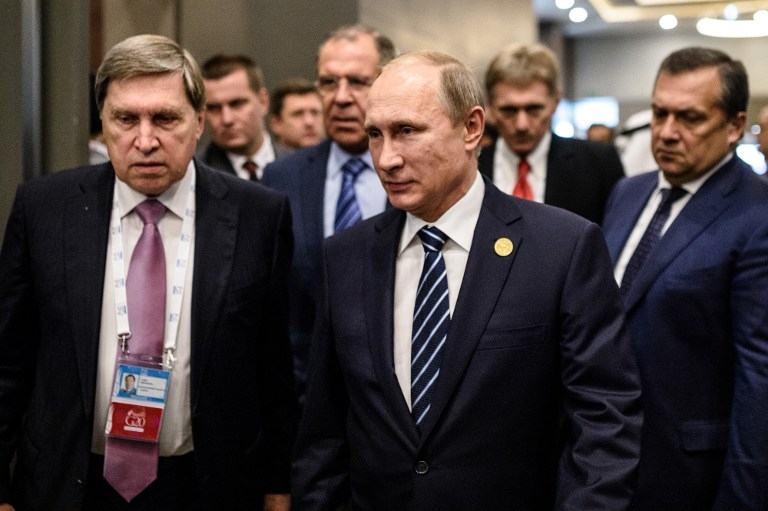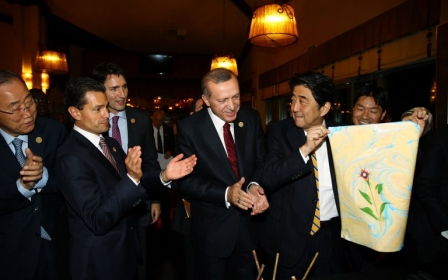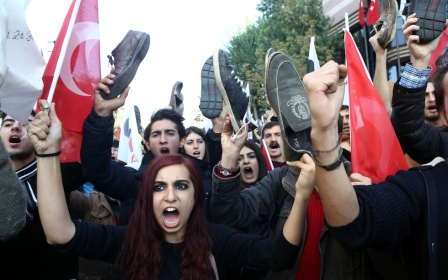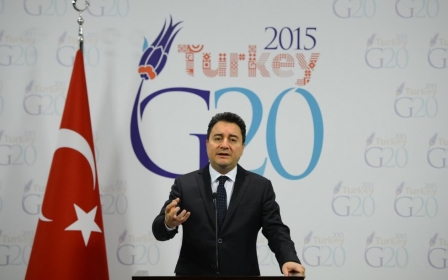G20 leaders vow to step-up fight against IS

World leaders vowed to tighten border controls, step up intelligence sharing and crack down on Islamic State (IS) financing at the G20 summit in Turkey.
Discussions at the two-day summit in Turkey’s coastal city of Antalya, which ended on Monday and brought together leaders including US President Barack Obama and Russia's Vladimir Putin, were dominated by Friday's attacks in Paris and the global threat posed by the Islamic State militant group.
"We are concerned over the acute and growing flow of foreign terrorist fighters and the threat it poses for all states, including countries of origin, transit and destination," said the statement released as the end of the G20 in the Turkish resort of Antalya.
Obama announced at a news conference on Monday that the coalition forces were intensifying air strikes against IS and targeting the group's leaders in Syria and Iraq, despite the group’s threat spreading beyond those borders.
Only a day before the coordinated Paris attacks, 43 people were killed in an attack in Beirut claimed by IS.
"The terrible events in Paris were obviously a terrible and sickening setback. Even as we grieve with our French friends, however, we can't lose sight that there has been progress being made," Obama said, while mentioning that the US was coordinating intelligence sharing with France.
At the same time, British Prime Minister David Cameron said the summit leaders "agreed to take further important steps to cut off the financing that terrorists rely on".
Putin said on Monday that he shared Russian intelligence data on IS with the world leaders, highlighting that the group has been financed by 40 countries, including some G20 member states.
Putin also spoke of the urgent need to curb IS's illegal oil trade and reiterated Russia’s readiness to support armed opposition groups in Syria in their efforts to fight IS, reported Russian news channel RT.
"Some armed opposition groups consider it possible to begin active operations against IS with Russia's support. And we are ready to provide such support from the air. If it happens, it could become a good basis for the subsequent work on a political settlement,” he said.
“We really need support from the US, European nations, Saudi Arabia, Turkey, Iran,” he added.
The summit joint statement pledged cooperation to fight IS: "We are resolved to address this threat by enhancing our cooperation and developing relevant measures to prevent and tackle this phenomenon, including operational information-sharing, border management to detect travel, preventive measures and appropriate criminal justice response."
But while the G20 leaders highlighted tools for combating IS, the joint statement did not include specific new measures or strategies, observers said.
Turkish President Recep Tayyip Erdogan urged deeper intelligence sharing and said leaders in the Muslim world must do more to break the perception that "terrorism" is affiliated with Islam.
"Terrorism has no religion, ethnicity or nationality," he said.
Erdogan warned against conflating the refugee crisis facing Europe with the threat from global terrorism, saying to do so would be to shirk a humanitarian responsibility.
IS took control of large swathes of Syria and Iraq and has committed atrocities against local populations including beheadings and massacres.
Economy and taxes
The summit also addressed economic cooperation and growth as economic growth remains uneven and weaker than expected globally.
The leaders of the world's largest economies said in the joint communique on Monday that they remain committed to a goal of lifting their collective economic output by an additional two percent by 2018.
Observers had previously pointed to the short-term economic strategy of the G20 leaders.
"The G20 needs to move beyond a predominately short-term crisis management role to focus more on the longer-term agenda for strong, sustainable and balanced growth," wrote senior fellow at the Brookings Institute Zia Qureshi in September.
During the summit, the leaders also approved a crackdown on tax avoidance by multinationals such as Google, Apple and McDonalds whose rock-bottom tax bills have provoked widespread outrage.
They put their final seal on a plan to close loopholes that let some big companies shift profits to low-tax nations so as to slash their bills, leaving ordinary tax payers fuming.
It comes a year after the "LuxLeaks" revelations that some of the world's biggest companies - including Pepsi and Ikea - had lowered their tax rates to as little as one percent in secret pacts with tax authorities in Luxembourg.
US President Barack Obama, Chinese leader Xi Jinping, and Cameron joined fellow leaders in endorsing a clampdown drawn up by the wealthy nations' Organisation for Economic Cooperation and Development.
In a joint statement delivered after the two-day summit, leaders declared that they "strongly urge the timely implementation of the project and encourage all countries and jurisdictions, including developing ones, to participate".
The OECD calculates that national governments lose $100-240bn, or between four and 10 percent of global tax revenues, every year because of the tax-minimising schemes of multinationals.
Its 15-point plan, adopted after years of negotiations, seeks to oblige multinationals to pay tax in the country where their main business activity is based.
Changing climate
The G20 leaders also backed a drive to curb catastrophic climate change at an upcoming UN conference in Paris, according to the joint statement.
Saudi Arabia and India had initially refused to include specific goals such as limiting global warming to less than two degrees Celsius above pre-industrialised levels, sources told AFP, but came around during the course of the summit.
France, backed by the EU, is working furiously to make the climate talks a success and Paris officials bristled at the reluctance of some countries to include its basic objectives in the statement.
"Climate change is one of the greatest challenges of our time," said the communique marking the end of the summit.
"We reaffirm the below 2C degree climate goal," it said, underlining a "determination" to adopt a deal with legal force.
The blockbuster climate meeting will assemble 195 countries outside Paris from 30 November to 11 December in a bid to reach a post-2020 pact to try to stem global warming.
The 2C goal has guided the long-running talks held under the auspices of the UN Framework Convention on Climate Change since 2009.
New MEE newsletter: Jerusalem Dispatch
Sign up to get the latest insights and analysis on Israel-Palestine, alongside Turkey Unpacked and other MEE newsletters
Middle East Eye delivers independent and unrivalled coverage and analysis of the Middle East, North Africa and beyond. To learn more about republishing this content and the associated fees, please fill out this form. More about MEE can be found here.




